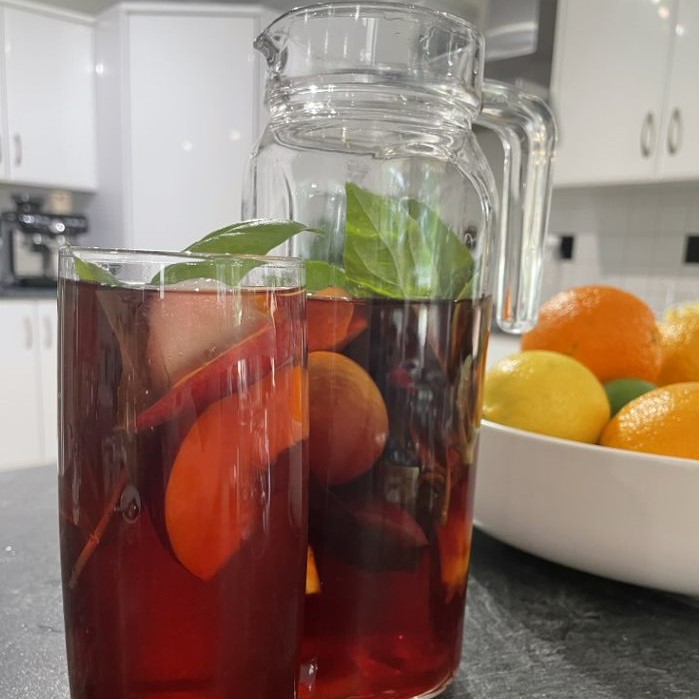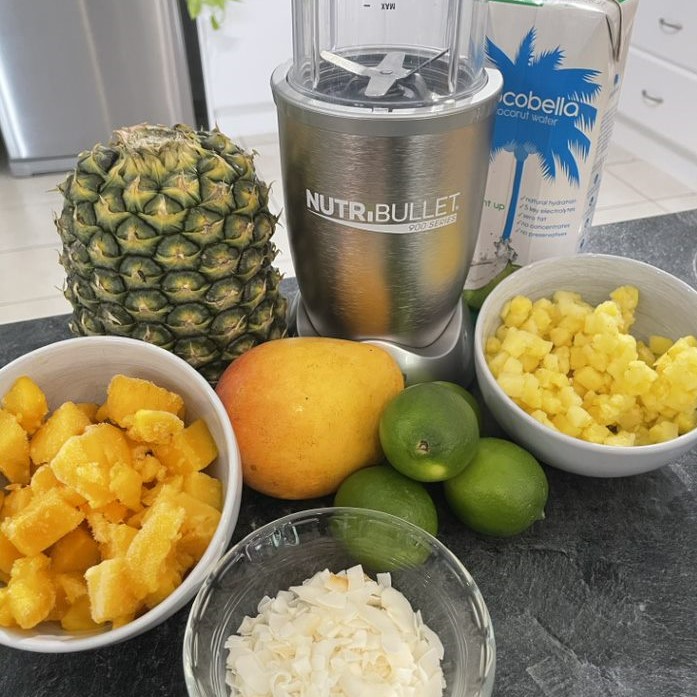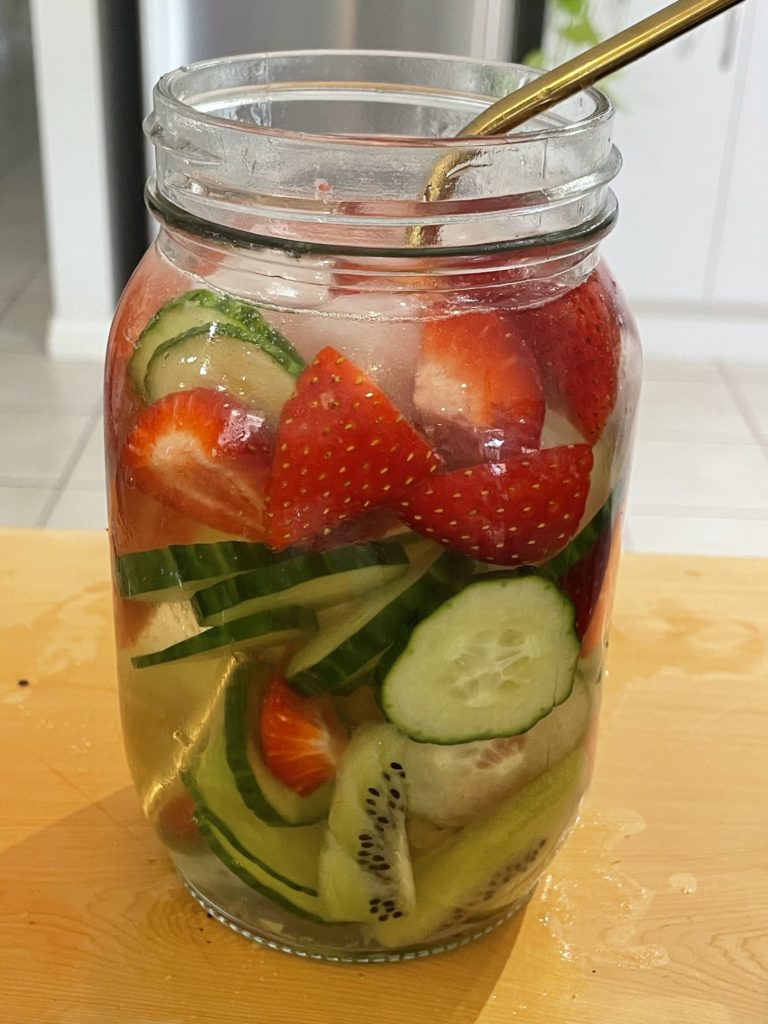A stiff or sugary drink might be just what you’re craving after this long year. But if you’re looking for healthy, refreshing drinks minus the excess sugar, we’ve got you covered. Our Research Dietitian, Megan Rebuli, has put together these delicious low kilojoule drinks to quench your thirst this summer.
Hydration is important all year-round. But it is even more essential during the hot summer months. Adults need to consume around three litres of fluid each day for our bodies to function at their best. Around a third of this comes from food. For most of us this means we need to drink around two litres of fluid every day. The exact quantity will vary depending on heat, humidity and how active you are.
We’ve all heard before that water is the best choice and sugary drinks like soft drink and cordial are not healthy choices. But what about all the other drinks? Here are some things to consider when choosing your beverages.
Cutting the kilojoules
Drinks are an often-overlooked source of energy (kilojoules). Low energy drinks such as plain water or soda water are excellent thirst quenchers. Add a squeeze of fresh lemon or lime for a citrus twist. Or try our Summer fruit and cucumber infused water for something a bit different.
Tea and coffee (such as a long black) without added sugar are another way to meet your fluid needs without added calories. For a refreshing crowd-pleaser, try our Peach and ginger iced tea with basil. Most fruity and herbal teas make a nice iced tea, but some teas are flavoured with sugar or syrups. So check the ingredients to ensure that the ones you choose don’t have added sugar.
For a morning caffeine hit without the heat, prepare a black or green tea in the evening. Steep for two to four minutes (black and green teas will taste bitter if left for too long) and cool overnight. Go easy on the caffeine because too much can have a diuretic effect.

Peach and ginger iced tea with basil.
Peach and ginger iced tea with basil
Makes 1 jug
Ingredients
- 2-4 scoops fruit or herbal tisane (tea) * (we used a combination of hibiscus and pomegranate tisanes)
- 2-3 peaches, sliced
- 1-2cm fresh ginger root, peeled and thinly sliced
- Handful basil, loose leaves and attached to the stem.
- Ice to serve
Method
- Place the scoops of tea in a teapot or infusion jug and add boiling water. Allow the tea to steep to your taste. If you like the tea strongly flavoured, allow to steep while it cools.
- Add the sliced ginger to the liquid and place in fridge to cool for at least four hours.
- Once the tea is cold, add the sliced peaches and basil, and stir. Add ice to the jug.
- Garnish with basil and serve.
Nutrition (per serve)
- 130kJ
- 0.5g protein
- 6g carbohydrate
- 2g fibre
- ½ serve of fruit
Vitamins and minerals
An added benefit of some beverages are vitamins and minerals – namely Vitamin C and calcium. Check out work by our team examining the nutrient intake from beverages consumed on the day of the last Australian health survey.
Fruit juice and smoothies made from 100 per cent fruit contribute to your daily Vitamin C intake as well as your daily fruit intake. This is a better choice than fruit drink, where generally less than half of the drink is made from real fruit. Check out our Mango splice mocktail, a tasty smoothie made with whole fruits. As well as Vitamin C, it contains a good serve of fibre!!
Animal and plant-based milks are another nutrient-rich beverage choice. Cow’s milk is naturally high in calcium and water and skim milks are low in fat. If you prefer plant-based milks, choose options that are fortified with calcium, are low fat and do not contain added sugar. Look for ‘unsweetened’ varieties.

Mango splice mocktail
Mango splice mocktail
Makes 2 glasses (or 1 large smoothie)
Ingredients
- 1 cup frozen mango
- 1 cup frozen pineapple
- Juice of 3-4 limes
- 1 cup coconut water
- Coconut flakes
Method
- Blend mango, pineapple, lime juice, and coconut water.
- Pour into glasses and top with a sprinkle of coconut flakes and garnish with a slice of lime.
Nutrition (per serve)
- 650kJ
- 1.5g protein
- 28g carbohydrate
- 5g fibre
- 1 serve of fruit
Sweet as
Many beverages are high in added sugar. Soft drinks are a key contributor to sugar in our diets as well as sugar added to coffee and tea. Drinks like soft drink and cordial are called ‘energy-rich, nutrient-poor’ or ‘empty calories’, because they contribute excess energy and added sugar to our diets without supplying beneficial nutrients.
Sugar-free varieties are low energy but research into the effects of sugar-free sweeteners on gut health suggest it’s better to steer clear of these as well.
- 100kJ
- 0.5g protein
- 4g carbohydrate
- 2g fibre
- ½ serve of fruit

Water a great idea it is to infuse your H2O
Summer fruit and cucumber infused water
Makes 1 jug
Ingredients
- 2 kiwifruits, peeled
- ½ – 1 punnet of strawberries
- 1 Lebanese cucumber or ½ continental cucumber
- Ice to serve
Method
- Rinse the strawberries and cucumber.
- Chop strawberries into quarters (or eighths if they are large!). Slice the cucumber thinly. Cut the kiwifruit in half, and then quarters.
- Add the ingredients to a large jug. Fill ¾ with water and chill for 30 minutes.
- Add ice to the jug and serve. This will keep refrigerated for up to 24 hours.
Nutrition (per serve)
Now sit back, relax and sip on one of these to cool down and hydrate the healthy way.


6th September 2022 at 8:51 pm
Amazing post, Thank you for sharing it with us!